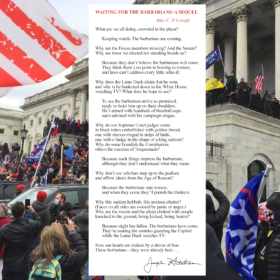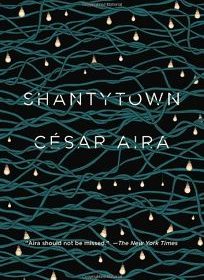-

I have never been so proud…
… to be a Coloradan! Let’s hope SCOTUS has the guts to read the U.S. Constitution’s very clear prohibition against insurrectionists running for office.Read More
-

Waiting for the Barbarians: A Sequel
This poem is an updated and repurposed version of “Waiting for the Barbarians,” by C. P. Cavafy, translated by Edmund Keeley. Read it here.Read More
-

History Makes Fascist Parents Flip Their Lids
Art Spiegelman, the Pulitzer Prize-winning creator of the classic graphic novel Maus, continues to inspire panic among the repressive nitwits seeking to ban their children from learning about history.Read More
-

What Comrade Trump and Comrade Tucker Want for America
https://lithub.com/on-the-ukrainian-poets-who-lived-and-died-under-soviet-suppression/Read More
-

#crushthecockroach
-

“The Greatest Liar in the World” (Flash Fiction by Etgar Keret)
In the wake of President Bonespur’s stint as a Mussolini-esque weatherman, Keret (as translated by Jessica Cohen) offers an especially resonant reading experience. Here’s one exemplary excerpt: [H]is mouth is a bona fide cosmic phenomenon, a black hole that sucks in reality and spits it out the other end as something completely different.Read More
-

The Statistical Minority
Josef Škvorecký, the great Czech novelist, author of The Engineer of Human Souls (beautifully translated by Paul Wilson) and other meditations on in the spiritual/intellectual havoc inflicted by totalitarians, writes this about the the rise and fall of the Prague Spring: The statistical majority struggles only for more bread; the statistical minority struggles too, for more non-bread.Read More
-

Maybe I’ll Try Make-Up, Like Dylan in Rolling Thunder…
-

Reality and the Kingdom of Images
How strange to discover the figure of Donald Trump in a 2001 novel by César Aira! I’m speaking of Shantytown, in which Aira presents a character called Judge Plaza, an obese woman with dyed-blond hair. Here’s how Aira describes her (pp. 128-129), in Chris Andrews‘ fine translation: Very confident, well-groomed, commanding and decisive. She had earned her reputation. She inspired fear. The tabloid journalists loved her, and so did their huge audience, who felt it was time for a tough and energetic justice, unhampered by wigs and precedents, ready to take to the streets and fight crime on its own turf.Read More
-

A Taste of Róbert Gál’s Signs & Symptoms
I discovered Róbert Gál through the anthology New European Poets, edited by Wayne Miller and Kevin Prufer, and bought his Signs & Symptoms because of what I’d read there. I don’t know if Gál is, in fact, a poet; he is certainly an aphorist, but he comes at the practice, it seems to me, with a philosopher’s spirit, not a poet’s. I don’t know if I can be clear about that distinction, but let me give it a try.Read More

 Joseph Hutchison, Colorado Poet Laureate 2014-2019, has published 20 collections of poems and edited or co-edited three poetry anthologies. He currently directs two master’s-level programs for University College at the University of Denver: Professional Creative Writing and Arts & Culture Management. Joe lives with his wife, Melody Madonna, in the mountains southwest of Denver, Colorado, the city where he was born.
Joseph Hutchison, Colorado Poet Laureate 2014-2019, has published 20 collections of poems and edited or co-edited three poetry anthologies. He currently directs two master’s-level programs for University College at the University of Denver: Professional Creative Writing and Arts & Culture Management. Joe lives with his wife, Melody Madonna, in the mountains southwest of Denver, Colorado, the city where he was born. 









